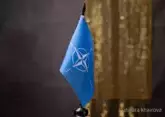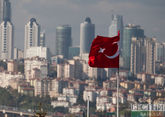The Netherlands called on EU officials to create a so-called military Schengen zone to ease movement of military personnel and equipment across EU and NATO borders
"We must be able to move quickly to any place where there is a threat," the Dutch defense minister Jeanine Hennis-Plasschaert said in a statement announcing her proposal at a meeting of NATO defense ministers in June.
The idea, loosely modeled on the open-border travel zone that has covered most of Europe since 1996, has also been a long-time goal of the senior United States Army commander in Europe, Lieutenant General Ben Hodges.
"Actually, I wish that we could move across Europe as quickly as migrants do," Hodges said.
"Of course, we should have to meet all the EU road laws, respect sovereignty, but it is a surprisingly cumbersome process in several countries to get permissions to move troops, weapons, ammunition, even just regular convoys," Politico cited Hodges as saying.
For example, moving U.S. forces to Poland from Germany, for example, requires a five-day notice period.
There are also infrastructure challenges: roads and bridges that potentially cannot bear the weight of heavy equipment; tunnels that are not tall enough; air strips that cannot accommodate all aircraft.
A NATO official said that the alliance supported the Dutch proposal, especially if it prompted the EU to take similar steps.
A military observer of the TASS news agency, retired Colonel Viktor Litovkin, speaking to Vestnik Kavkaza, noted that the creation of a "military Schengen zone" is quite realistic. "If Europeans really need it, they can create a "military Schengen". Nevertheless, not all NATO members will like it," the expert said.
According to him, the discussion on this issue will be difficult, but the US may push this idea, since this step will allow them to move troops whenever they want. "All this will happen under the guise of Schengen. And although the US is not part of the Schengen zone, nevertheless, it will be done in their interests," the retired colonel explained.
At the same time, he drew attention to the fact that there will be no reaction from Russia on this matter. "We are neither members of the Schengen zone nor NATO members. Maybe there will be some statement from the representative of the Defense Ministry. We do not interfere in the internal affairs of other states," Victor Litovkin summed up.
The director of the Institute of Political Studies Sergei Markov, in turn, expressed an opinion that the creation of a "military Schengen" is unlikely. "The fact is that today there are no real military threats to the EU and to NATO members. All their security threats are non-military: terrorism, drug trafficking, as well as ethnic communities, which are self-governing in a criminal way and do not follow the general law, they are not integrated. Of the major military powers, only Russia and Iran are close, but both these countries do not pose any military threat to the EU and NATO countries," the expert said.
At the same time, he pointed out that the current "concern" of Europeans with this issue is primarily caused by the desire of the military bureaucracy and the military-industrial complex to maintain inflated budgets in conditions when countries, in fact, do not need such armies. "Another reason is the irrational psychosis associated with the general political crisis. All understand perfectly well that the anti-Russian hysteria and attempts to inflate the military budgets have nothing to do with real problems, but, on the contrary, can create unnecessary problems," the political scientist said, adding that the idea of the head of the Ministry of Defense of the Netherlands will not be supported at a closed meeting of the budget subcommittee.










